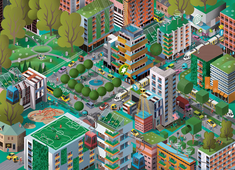Future Cities, Future Life
ELLS Scientific Student Conference 2012 Future Cities – Future Life (Sciences) Nov. 9-10, Swedish University of Agricultural Sciences, Campus Alnarp, Sweden Call for Abstracts Deadline for submission: June 15 Travel grants are available, the best presentations and posters will receive a financial reward! http://www.slu.se/ells2012 Within the following important sub-themes, we invite students to present descriptions of the problems and challenges involved and their views and findings on how life science can help finding solutions for the future. Supply chains Producing healthy and nutritious food and other necessities for a growing population presents us with a number of challenges. Agriculture, farming and forestry in urban and periurban areas will play an important role for future life in future cities. Production systems include agricultural and horticultural crop production, animal production as well as forest production. Different aspects of supply chains can be discussed such as influence on the environment, sustainable and economical use of resources, advance in technology, and achieving and keeping good product quality e.g in the food chain. Transport, storage and marketing can also be discussed in connection to production systems. Ethical aspects and equity issues are of great interest as is the obesity epidemic that is especially prevalent in fast growing cities. Energy supply and waste management are central issues for achieving sustainable production systems. Forestry as well as agriculture requires substantial energy input but at the same time supply society with renewable energy and are thus important for the future energy supply. Urban Enviroment Cities are growing rapidly and good urban planning and well designed urban environments are essential for the development of future cities and future life. To reach this we have to be creative and innovative with new ideas and solutions. Relevant questions in this work come from a broad range of fields. How do we handle conflicts of interest related to land and water use? How can we combine food production and housing? How do we secure and manage urban green areas for recreation? How can urban planning create possibilities for living with pets? In what way can public spaces play a role for democratic movements? How can we increase social interaction and awareness of sustainable development? How should we deal with ecological considerations and wild life preservation in the human habitat? How do we consider climate change when we plan our cities? All these questions imply the need for integrating different life sciences disciplines to find new methods and strategies regarding planning, management and design of the urban and periurban green resources. Human – Animal interrelations Over the last decades, a number of worldwide epidemics have broken out, several of which have been zoonoses. At the same time, the prevalence of resistant bacteria is rapidly increasing on a global scale as a result of an ever-more extensive use of antibiotics, both in human medicine and in livestock production. In addition, the growing prevalence of lifestyle diseases, combined with demographic factors such as a general increase in longevity, presents a tangible problem for future generations, both for humans and animals. In what way does human health affect animal health and vice versa? How can research on human health gain from studies on animals? Animal resources also play an important role for human wellbeing in urban areas. Questions that can be addressed are for example: how do sport animals and pets affect the life style of urban citizens? How can we ensure good conditions for animals in urban areas? Call for Abstracts All students of members of the Euroleague for Life Sciences, like BOKU, are invited to present their papers (e.g. bachelor or master thesis, first results of PhD-Research or other research project)! To apply for an oral presentation or poster presentation at the conference you should prepare an abstract before June 15. The abstract should be sent together with an academic CV and an application form to the local contact person. Contact person at BOKU: Ulrike Piringer: Ulrike.piringer(at)boku.ac.at Application form and Further information: http://www.slu.se/ells2012 Poster: Poster as PDF

